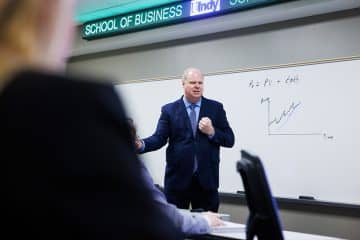Can You Complete an MBA Program in One Year?
The business world these days is changing at an increasingly high rate and, as a business professional, you might want to stay one step ahead and get an MBA as quickly as possible. Already popular in the UK, one-year MBA programs are gaining traction stateside. These accelerated programs allow students to complete an MBA in half the time, which can be an attractive opportunity for the efficient business person. So, can you complete an MBA program in one year? The answer is yes, but there are a few caveats! These programs are typically aimed at seasoned business professionals who don’t necessarily need an internship or networking events. But if it’s right for you, then go for it. As you decide whether or not a one-year program is right for you, consider the following:
Where you are in your career and where you want to be:
Are you fresh out of your undergraduate career? Although you may have a bachelor’s in business, you might need more business experience to benefit from a one-year MBA. Many of these programs are designed with the assumption that students have at least a few years’ worth of real-world experience. Thus, basic foundational courses might be emitted in favor of more specialized topics. They also might forgo an internship or practicum requirement, which might not be necessary for more seasoned business professionals. Some one-year MBA programs might even go so far as to set a requirement for prior experience. Check with your school to see whether that’s the case. Even if there isn’t a formal prior-learning requirement, reach out to an advisor to discuss whether your experience is sufficient enough for a one-year program.
Your budget and what you can afford:
Time is money! And less time in school means less money, right? Right. However, it’s still necessary to do a cost-benefit analysis of a one-year program vs. the traditional two-year program. While the brevity of a one-year program means you can return to the workforce more quickly, it also means that the program’s rigor might require you to leave the workforce entirely in the first place. Most one-year programs are full time, which makes working while learning a significant challenge. If you can afford to take the time off of work and to pay the sticker price of the program, go for it! If not, a part-time MBA program, which will have to take place over a longer period of time, will allow you to work while earning your degree. Even better, see if your employer will foot the bill; since you are expanding your skills, your education is a solid investment on their part. Check with your company to see if they offer employer tuition assistance!
Read more: Should I Enroll as a Part-Time or Full-Time Student?
Whether you want to specialize with a concentration:
MBA curricula are pretty broad in the sense that they teach the fundamentals of business administration that are applicable in all settings. To further specialize your skill set or break into a niche business sector, you might consider a concentration. Concentrations allow students to focus on one particular area of business, such as finance, marketing, or supply chain management. These courses supplement the general MBA core curriculum and help you demonstrate a specialized skill set to employers. Many one-year programs, like the accelerated MBA at the University of Miami, do not offer concentrations. If you’re just starting out in your business career and desire the increased marketability of a concentrated MBA, then this kind one-year program isn’t right for you. Once again, these programs are designed for experienced business professionals for whom a concentration may not be as relevant to their career advancement.
The kind of experiential learning opportunities you want:
Internships:
Most, if not all, traditional MBA programs require an internship, which is typically completed in the summer between the first and second year of study. Given the shorter time frame of a one- year MBA, internships are typically not required, if they are even offered at all. Internships are crucial for younger business students for a couple reasons:
- Real-world application of knowledge: How better to know you can manage a supply chain than to do so at an actual organization! An internship in your desired field will give you tangible experience and further contextualize what you’re learning in the classroom. Of course, if you’ve been a supply chain manager for 15 years, you definitely don’t need an internship. Like we said, it all depends on where you are in your career.
- Job opportunities: many high-profile companies recruit full-time employees from a pool of their interns. According to a 2012 survey conducted by the National Association of Colleges & Employers (NACE), 40% of new hires from that year were chosen from the company’s internship program.
Networking:
The more time you spend on campus, the more time you have to connect with your professors and peers. You never know how you can grow your network with these connections. This is not to say that you cannot do the same in a one-year program, but if you’re looking to attend networking events or develop long-lasting relationships with your peers, then a traditional two-year program might be a more inspiring fit.
Read more: MBA Programs That Also Help You Find Employment.
Ultimately, the answer to whether you can complete an MBA program in one year depends on you. Think about where you are in your career and where you want to go. One-year MBA programs are gaining popularity in the U.S., so their offerings are becoming more and more enticing for aspiring and seasoned business professionals alike. Here at Abound: MBA, we are all about acceleration. Take a look at the schools we trust and find the MBA program that’s right for you.





